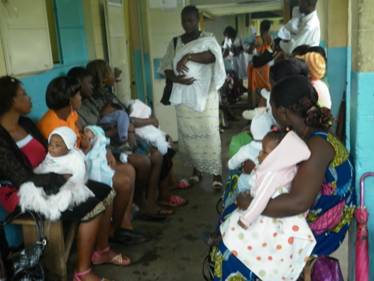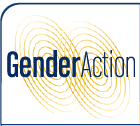|

Gender Action's Reproductive Health and HIV/AIDS Program:
In many developing countries, IFI investments do not address gender roles, creating projects and programs that can bypass and/or disadvantage women, reinforce women's poverty, and undermine poor women's and men's access to sexual and reproductive health and rights (SRHR) and HIV/AIDS services. IFIs like the World Bank emphasize their commitment to the Millennium Development Goals (MDGs), including those related to reducing maternal mortality, enhancing access to sexual and reproductive health care, and combating HIV/AIDS. It is widely understood that gender inequality undermines women's SRHR and fuels the spread of HIV. However, IFIs spend a tiny fraction of their multi-billion dollar budgets on population and sexual and reproductive health and HIV, according to Gender Action research.
Through rigorous research and targeted campaigns, Gender Action advocates for increased IFI spending on SRHR and HIV/AIDS worldwide. In order for these investments to be truly effective, Gender Action also pressures IFIs to ensure a gender-sensitive focus in their investments and remove loan conditions which impede progress towards ensuring women's access to SRHR, HIV/AIDS care and protection from sexually transmitted infections. Gender Action also advocates for IFI grants only to end low-income countries' debt burden, which limits spending on health and other basic needs.
Gender Action's qualitative and quantitative research on IFI investments and gender impacts provides the basis for developing resources and tools for civil society advocates on SRHR and HIV/AIDS. We advocate with other civil society partners for more money better spent by IFIs on SRHR and HIV/AIDS. Our resources include:
Publications:
Banking on Health:
World Bank and African Development Bank
Spending on Reproductive Health and
HIV/AIDS in Sub-Saharan Africa
October 2012
Based on fieldwork in Cameroon and Uganda, 'Banking on Health' reviews World Bank and AfDB projects to highlight how good quality matters as much as high quantity in reproductive and sexual health and HIV/AIDS spending.
A database containing comprehensive information about World Bank and AfDB investments (2000-2012) addressing reproductive health and HIV/AIDS in sub-Saharan African countries accompanies the report.
Banking on Health also gained media exposure in This is Africa (a FT publication):
Measuring the Role Gender Plays in Development Bank Lending
Claire Lauterbach, October 10, 2012
Gender Action Link: IFIs and Sexual and Reproductive Health
February 2011
A quick and cogent analysis of the IFIs' policies on sexual and reproductive health.
Gender Action Toolkit: Increasing and Improving Multilateral Development Banks' Funding for Reproductive Health & HIV/AIDS: A Toolkit for Advocacy
April 2009
A useful toolkit for civil society groups worldwide to hold MDBs accountable on meeting their promises to promote reproductive health and respond effectively to HIV/AIDS.
Mapping multilateral development banks' spending on reproductive health and HIV and AIDS
June 2008 Gender & Development Volume 16, pp. 287-300.
An article drawing on research by Gender Action, presented in a groundbreaking report investigating multilateral development banks' (MDBs) spending on reproductive health and HIV and AIDS.
Mapping Multilateral Development Banks' Reproductive Health and HIV/AIDS Spending
September 2007
A broad introductory analysis of SRHR and HIV/AIDS spending, quality and quantity, by IFIs across the globe from 2000-2007.
Our publications for advocacy include:
Letter to the President of the World Bank on World AIDS Day (December 2010) to appeal for dramatically increased and improved World Bank investments in HIV treatment and prevention.
Letter to the President of the World Bank (September 2009) urging him to integrate gender into World Bank HIV/AIDS and SRHR investments. Led by Gender Action; signed by 101 signatories.
In April 2007, Gender Action co-led a successful emergency civil society sign-on campaign that prevented the World Bank from weakening its Health, Nutrition and Population (HNP) Strategy by ending commitments to Bank funding for family planning, safe abortion and SRHR. As a result of our advocacy, the World Bank restored it.
|
